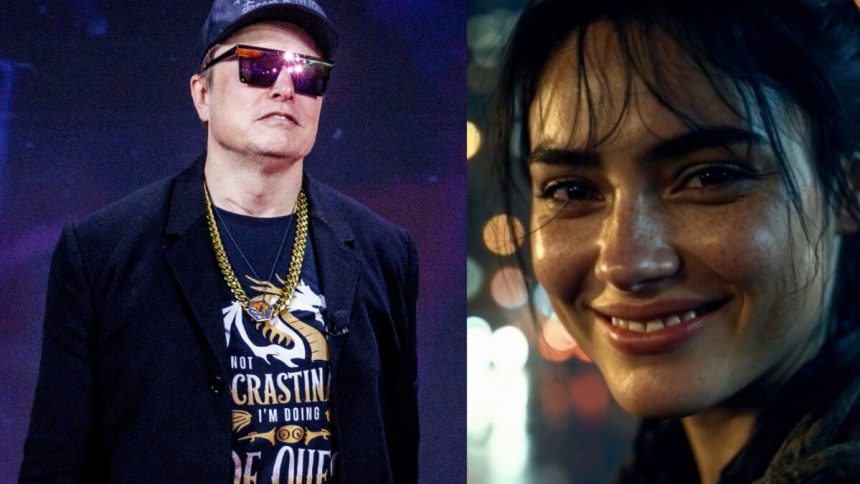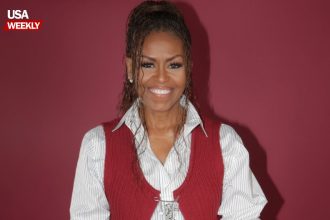Elon Musk, the world’s richest individual, appears increasingly detached from reality. Following a critical observation from a renowned author, he seems resolute in trying to demonstrate his human side and interests.
The saga began early Saturday morning when Musk shared an AI-generated video on X at 3:20 a.m. Central Time. He captioned the post with the prompt, “Grok Imagine prompt: She smiles and says ‘I will always love you.'” This video, unsettling in its presentation, features an AI-created woman who initially looks concerned before delivering a disingenuous smile, a gesture often associated with insincerity. The audio doesn’t align well with the visual, further detracting from the content.
Yet, the deeper issue at play reflects Musk’s apparent struggle with genuine human connection. His thirst for love and companionship is something many can relate to, but Musk’s complex relationship with women and their societal roles may complicate this pursuit. In July, he controversially claimed that women were “anti-white” due to perceived physical weaknesses. Additionally, he has categorized empathy as a negative trait, leading to accusations that his actions contributed to around 600,000 deaths through his impact on USAID during his leadership of DOGE, as reported by the New Yorker.
Wealth has insulated Musk, yet he seems to inhabit a self-created bubble that inhibits authentic connections. Since acquiring Twitter in late 2022, he has altered the platform’s algorithm to favor amplifying praise directed at him. By allowing anyone to purchase a blue verification badge for $8, Musk effectively prioritized visibility for those who align with his interests.
His ventures into artificial intelligence through Grok and xAI further illustrate this self-referential ambition. In a recent podcast with Joe Rogan, Musk predicted that in the near future, most content consumed—whether music or video—would be generated by AI. “Most of what people consume in five or six years, maybe sooner than that, will be just AI-generated content,” he claimed. Rogan’s enthusiasm for this notion echoed a sentiment prevalent among wealthy, middle-aged men.
Amidst these developments, Joyce Carol Oates, the esteemed 87-year-old author, took to social media on Saturday to critique Musk’s online presence. She expressed her bewilderment that someone of his wealth appears disconnected from common cultural experiences. Oates tweeted, “So curious that such a wealthy man never posts anything that indicates that he enjoys or is even aware of what virtually everyone appreciates—scenes from nature, pet dog or cat, praise for a movie, music, a book (but doubt that he reads); pride in a friend’s or relative’s accomplishment; condolences for someone who has died; pleasure in sports, acclaim for a favorite team; references to history.”
She concluded her tweet with a poignant remark, suggesting that the “poorest persons on Twitter may have access to more beauty & meaning in life than the ‘most wealthy person in the world.'” Musk’s activity on X, often filled with complaints about transgender individuals and interactions with far-right figures, signals a focus on self-promotion rather than broader engagement with cultural milestones.
Oates’ observations clearly struck a nerve with Musk. In response, he fired off a series of defensive tweets, labeling her comments as “demonstrably false,” referring to her as an “angry liar,” and stating, “Oates is a liar and delights in being mean. Not a good human.”
In a seemingly desperate attempt to show he has normal interests, Musk engaged with film-related tweets from a user account that discusses movies, making declarations such as, “Man on Fire is great!” and “Fifth Element has great style.” Notably, one reply connected a character in a tweet back to a hairstyle Musk had previously sported, giving the exchanges an air of performative effort rather than genuine engagement.
Responses to Musk’s attempts were largely mocking from users on Bluesky, where the left-leaning community did not hold back. While he has recommended books and films in the past—such as repeatedly suggesting The Iliad as an audiobook—his understanding of media has sometimes come under fire. For instance, in a biography, he misinterpreted the messages in Douglas Adams’ The Hitchhiker’s Guide to the Galaxy, misunderstanding it as advocating for expanding consciousness rather than its true criticism of imperialism.
Musk’s commentary on Blade Runner, describing his Tesla Cybertruck as something “Bladerunner would have driven,” further illustrates his disconnection, as he mistakenly referred to the film’s title rather than its narrative context.
Despite his immense wealth, Musk’s actions reveal that financial status cannot replace meaningful human connections. In his quest for recognition as a ‘Nerd King’ through his awkward social media posts, he has built a virtual existence where he can interact with AI rather than addressing the emotional needs of actual human beings. While many on X provide him with uncritical admiration, comments from figures like Oates highlight his struggles with authenticity, revealing a man unsure of how to navigate the complexities of human relationships.








